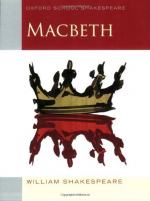|
This section contains 889 words (approx. 3 pages at 300 words per page) |

|
Imagery of Snakes in Macbeth
Summary: An analysis of the imagery used by by William Shakespeare in his classic drama, "Macbeth."
In the biblical book of Genesis, Eve is tempted by a serpent to commit an ungodly act of eating a forbidden fruit. As a result of the snake's temptation, Eve eats the fruit, resulting in the presence of worldwide sin and the downfall of perfection. From this story of Adam and Eve, the figure of the snake has become generally associated with temptation, evil, and cynicism. William Shakespeare employs this symbolic imagery of snakes in Macbeth, to enhance the story of the rise and fall of Macbeth's power. For poetic and playwright purposes, Shakespeare uses serpentine imagery to reveal the malevolence of characters, and portray the threatening position of the throne, all while provoking a heightened emotion of fear and tragedy from the audience.
Works cited
1. Oxford English Dictionary. Search: gall.
The first image of the snake is revealed during the initial arrival of evil. In act one...
|
This section contains 889 words (approx. 3 pages at 300 words per page) |

|


